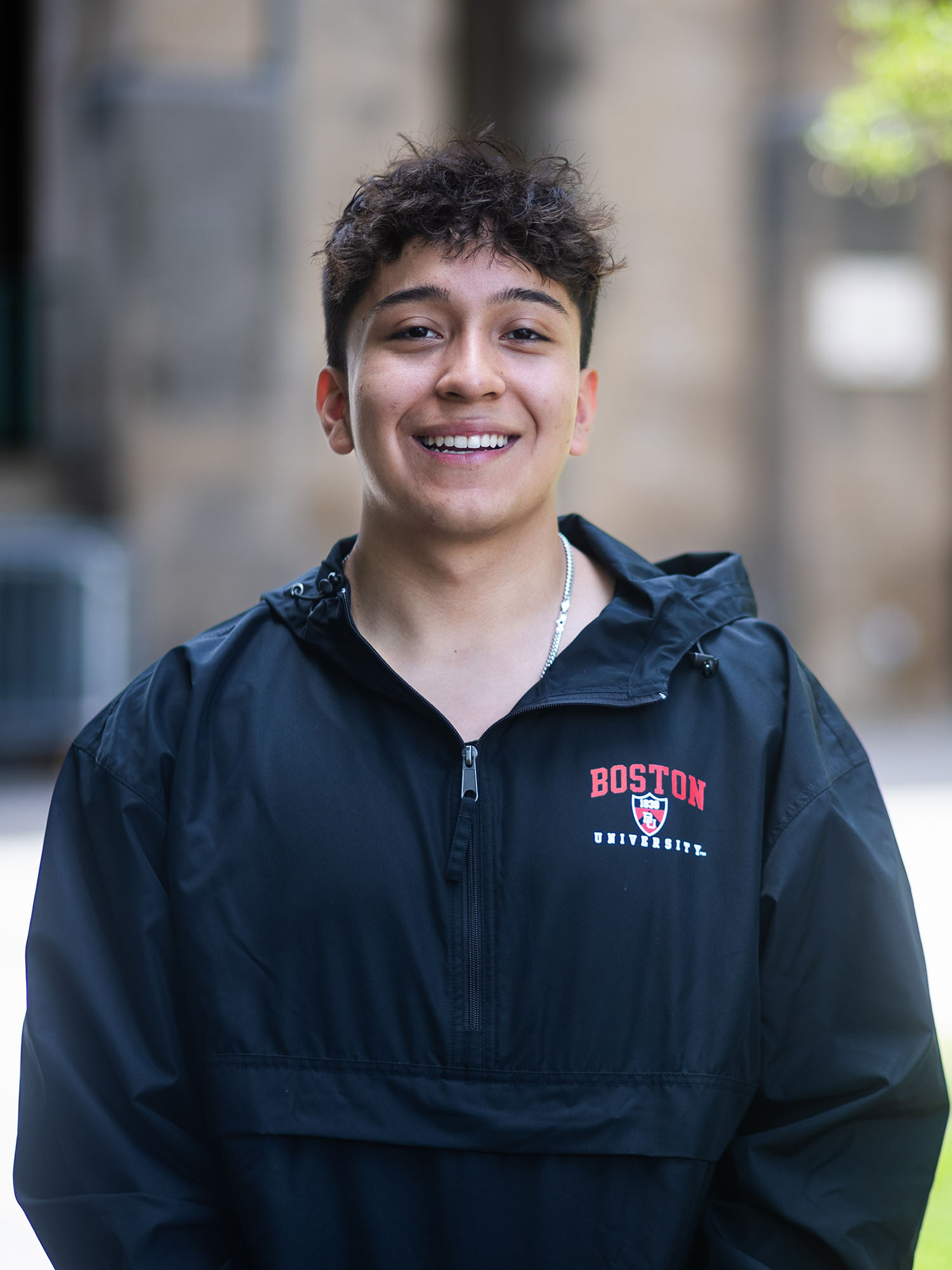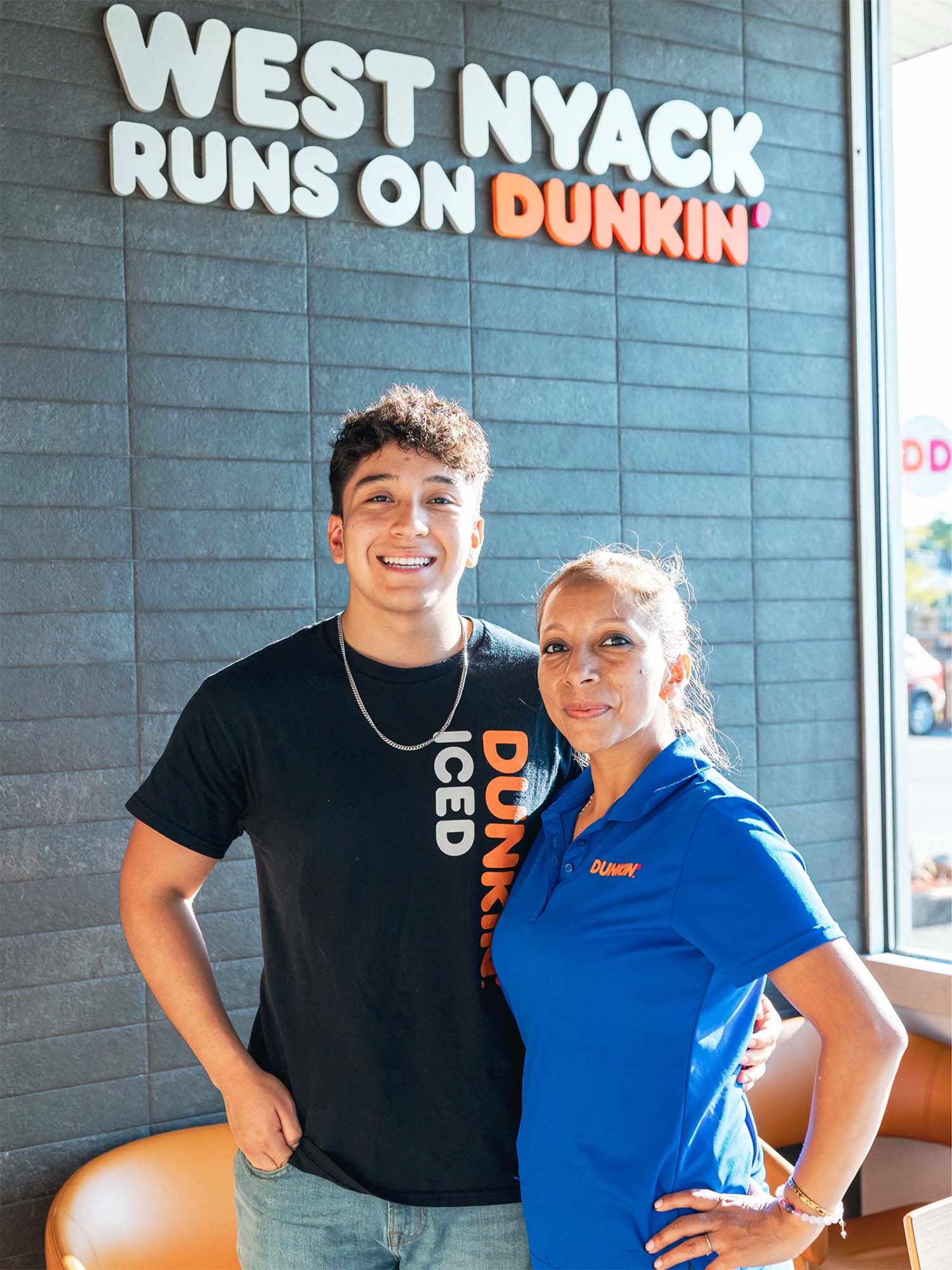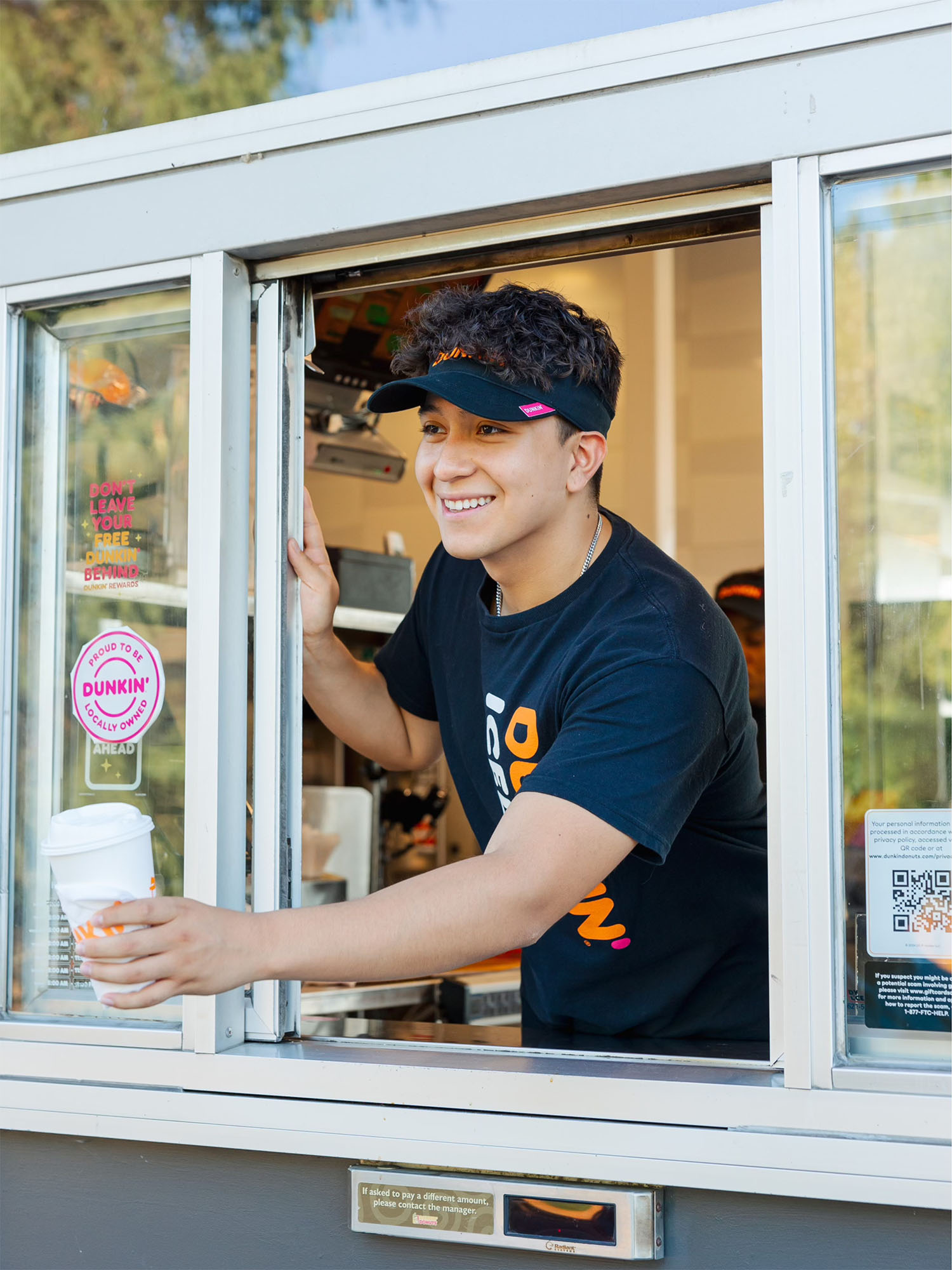Introducing BU’s Newest Terriers: Jonathan Galdamez
His road to success runs through a Dunkin’ franchise

Jonathan Galdamez (Questrom’26) learned a lot selling coffee and donuts for Dunkin’ before transferring to BU from a community college. Photo by Eric Haynes
Introducing BU’s Newest Terriers: Jonathan Galdamez
His road to success runs through a Dunkin’ franchise
This fall, 3,300 freshmen and 926 transfer students begin their careers at Boston University. As the 2024-2025 school year starts, we bring you some of their stories.
Jonathan Galdamez made it to Boston University thanks to intelligence, character, persistence, and…Dunkin’?
A job with the donut chain’s outlet in West Nyack, N.Y., across from the Palisades Center mall, allowed his immigrant single mother to keep a roof over their heads. Galdamez (Questrom’26) did his homework in an empty booth after school.
Eventually the franchise became a job, and even a kind of business school, for Jonathan too, teaching him about everything from basic responsibility to inventory to customer interactions, good and bad.
“I’ve grown up there,” says Galdamez, who transferred to BU this fall from a community college. “With my mom there, I’d help her count money. I’d help her take care of inventory. I’d help her take care of just business overall, because she was in charge of the whole store, and anytime she’s gone, I’d just take over.”
Teresa Paguay was a teenager in a poor village in Ecuador when she decided to seek a better life for her unborn child by joining her sister in a small town in New York’s Hudson Valley. She was eight and a half months pregnant when she arrived. She and her son ended up sharing an apartment with other immigrant families for the first years of his life, in a town with large Black and Latino populations and a school system Galdamez says was struggling.
But while he faced challenges in school, his mother started working at the Dunkin’ across from the mall in West Nyack, a more privileged community 15 minutes down the road.
“When I got out of school, I took a taxi by myself when I was like seven or eight,” he says. “Every day. When I got to this Dunkin’, I would just sit and study and wait for my mom to get off work.”
His mother, he says, is an energetic woman who keeps going whether she’s closing the store at night or opening early in the morning—or both. “She’s just ready, you know? I think I get my energy from her. I can’t drink any energy drinks because it’ll drive me crazy.”

She advanced quickly through the ranks of shift leader and assistant manager, making herself invaluable to the family who owned the donut shop. After a confrontation with his school—a teacher insulted his mother’s poor English—the Dunkin’ owners helped Jonathan and Teresa move so he could attend West Nyack schools, where he started in an ESL program.
Game changer!
“The jump was just so drastic,” he recalls. “I’d be all day working with some amazing teachers. They really pushed me. And they really helped me. They never made me feel dumb. They would tell me I was bright and that I just needed a little help. So, fast forward to my high school years, I actually ended up catching up to other students as well. I was better than most students academically.”
And while there were very few brown faces in his new district, he never felt discriminated against. “It was very funny. I feel like a lot of people just took me in because they’re like, ‘I have never met a Hispanic student.’ A lot of them were like, ‘What are you, Mexican?’ I’m like, ‘No, Mexicans are not the only Hispanic people in this world.’ And I’d have to teach them. But the majority of them were always very good, respectful.”
No surprise that he’s fluent in Spanish and English, but he also speaks Japanese, thanks to the ambitious Nyack schools.
A second chance
One way the new district didn’t serve him well was in the college application process. Most of the students knew about things like financial aid forms, and many had private coaches for the process. No one brought Galdamez up to speed, and he was embarrassed to admit how much he didn’t know. He ended up going to Rockland Community College, SUNY. But the struggle motivated him.
“I told my mom, if I’m going here, it’s because I’m getting a kind of a second chance. I really want to show them what I’m capable of, and I made sure that I was locked in, and that I was gonna make something of myself.”
I really want to show them what I’m capable of, and I made sure that I was locked in, and that I was gonna make something of myself.
In high school, he had taught himself to code, mainly thanks to YouTube. By the time he got to community college, he had his own web development company, serving numerous area businesses with online marketing and ordering. He founded his community college’s first Shark Tank Challenge, served as finance and marketing chair of its Sustainability Club, was a senator in the Student Government Association and president of the school’s Phi Theta Kappa chapter. And he started a business club.
“I actually taught students there BASIC and web development, how to create your own logo, how to get that patent and pretty much start your own company,” he says. “I love business. I love technology. I love coding. I want to get into business analytics.”
Galdamez also started a nonprofit, Next Scholars, holding seminars to help area students, especially those from immigrant or underserved communities, have a better experience applying to colleges than he had the first time around.
Along the way, he found time to complete two internships this past school year: one with a large food service company and the other in the office of the mayor of his old suburb. “I actually was able to work with him for five months, creating a plan, seeing how we could give better funding to those schools,” he says.
As Amanda Hugh, his honors program supervisor at Rockland Community College, wrote in a recommendation, “Jonathan is one of those students whom you will never forget. He is caring, passionate, a go-getter, and has accomplished more than people twice his age…I have no doubt that Jonathan will go on to do amazingly innovative things that will wow the world and serve others along the way.”
Through all of this, he already had his eyes on BU. It was the first college he ever visited. He’d come along for Orientation with a high school friend, who’d been accepted, and his parents.
“I fell in love, to say the least,” he says. “I knew that BU was the place for me.”
“I was in Puerto Rico when I was accepted to BU,” Galdamez says. “I was there for my girlfriend’s sister’s wedding. I was over the moon when I opened my decision. I was in an Uber, and I was just screaming because of how excited I was. The Uber driver was so happy. My mom was also excited. I FaceTimed her before I opened it, and when I did, oh, my God! It was a huge thing! I think the Uber driver was actually the most happy.”

No surprise that he wrote his college essay about working at Dunkin’ with his mother.
“I’ve been working at the store ever since I was born,” he says with a laugh. “I love customer service. My mother just went home to Ecuador for a little vacation, so I actually ended up taking over the store.”
“We definitely have a lot of fights about certain things. But at the end of the day I feel like we work very well together,” he says. “We’re very quick on our feet, and we’re one of the fastest Dunkin’s. We maintain a 50-second [average] for each customer to come in, order all your food, and get out.
“I was a quiet kid before Dunkin’,” he says. “I was around there all the time, and then at 14, I finally got my working papers. And it wasn’t until working there that I realized people can get mad at me if I mess up an order. But it’s what I do after that really matters, you know: ‘I’m sorry, and I can fix the situation.’”
Given his entrepreneurial bent, it’s also no surprise that he is looking forward to the various start-up and pitch competitions at BU, as well as finding a good internship in the city.
Galdamez is planning for success, and there’s a lot to like about Questrom, he says.
“They even have Starbucks in their building, which I’m really excited about,” he says with a chuckle. “Even though it’s not Dunkin’, it’s OK.”

Comments & Discussion
Boston University moderates comments to facilitate an informed, substantive, civil conversation. Abusive, profane, self-promotional, misleading, incoherent or off-topic comments will be rejected. Moderators are staffed during regular business hours (EST) and can only accept comments written in English. Statistics or facts must include a citation or a link to the citation.